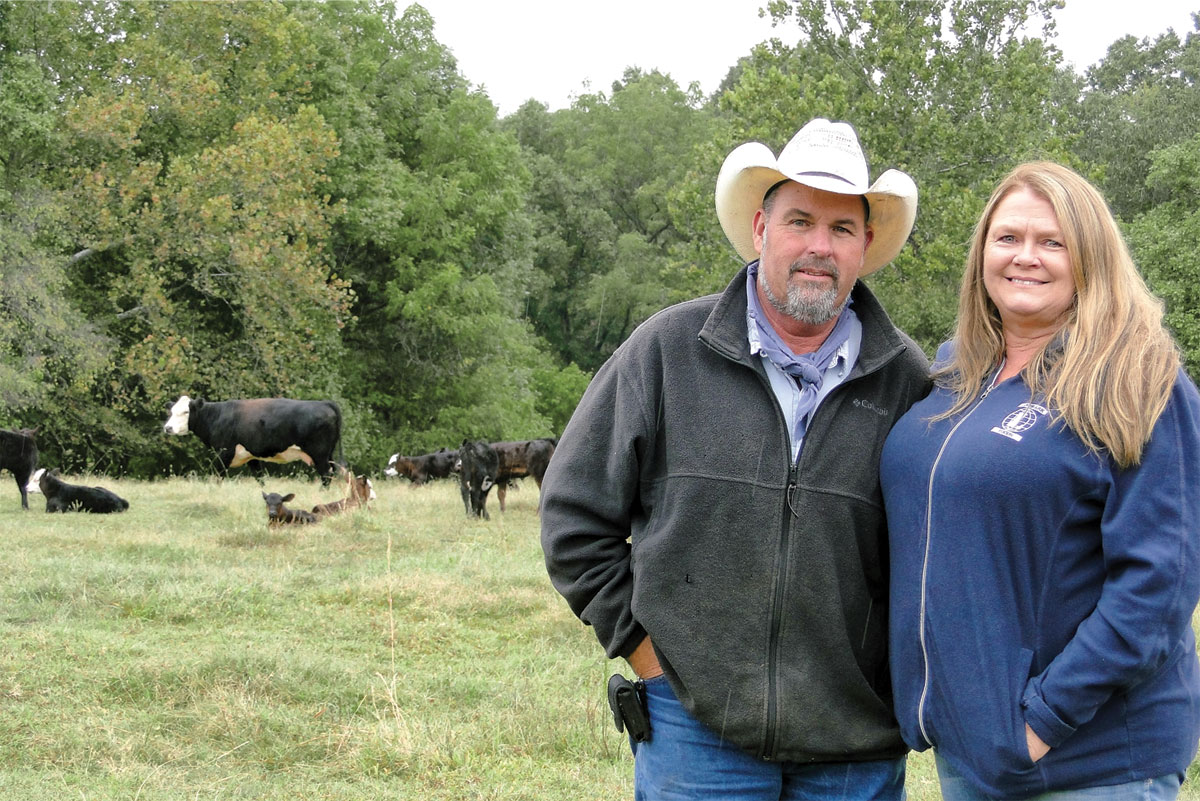
Parmley Cattle Company builds on their foundation for the future
WYANDOTTE, OKLA. – Jeff Parmley, 52, was immersed in the world of cattle farming from a young age. Raised by parents who were both lifelong cattlemen, Parmley grew up working on their operation, Parmley Simmental and Angus, which was established in 1972. This early exposure to the agricultural life formed the foundation upon which he’d build his future.
Over the years, Parmley gained invaluable experience working in feedlots and managing a cow-calf operation. After seven years of working for the Oklahoma State University (OSU) Extension Service, he returned to farming full-time.
Parmley made that decision a decade ago. Today, he’s reconnected with his roots, and although a lot has changed in the agricultural landscape, Parmley’s work ethic has not.
Today, he operates Parmley Cattle Co., a successful and thriving cattle business located in Northeast Oklahoma and Southwest Missouri. His wife, Angie, and their two sons (both in their early 20s) are active in the operation, which comprises approximately 1,500 acres of land.
Parmley Cattle Co. is focused on raising Simmental, Angus, and Sim-Angus cattle. These breeds were chosen because of their strong maternal traits, which are essential for building a healthy, productive herd.
According to Parmley, the Simmental and Angus breeds complement each other in a way that optimizes both maternal performance and carcass quality.
“The Simmental and Angus complement each other to provide maternal benefits and excellent carcass characteristics,” he said.

This careful pairing of genetics is conducive to high-quality livestock that meets the demands of today’s market which, as we all know, is not the most consistent.
At Parmley Cattle Co., purebred Angus cows are mated with purebred Simmental bulls to produce Sim-Angus calves, which are born in the fall and spring. The heifers born from these mating’s are then grown out and sold as open yearlings.
Twice a year, in March and October, Parmley selects 50 quality bulls from the herd for private treaty sales. These bulls are carefully chosen for their superior traits and are in high demand which helps drive the success of the business.
“Herd health is important to us,” Parmley mentioned when discussing the farm’s approach to cattle care.
Maintaining healthy cattle is a priority at Parmley Cattle Co., and to achieve this, the farm follows a rigorous vaccination and deworming schedule. All cattle are vaccinated and dewormed twice a year, and calves of weaning age receive several rounds of vaccinations, including respiratory and Blackleg immunizations. Parmley also ensures that the cattle are provided with a balanced diet, including supplements from Suther Feeds to ensure they receive the necessary minerals and proteins for optimal growth and development.
In addition to the health of the cattle, Parmley Cattle Co. recognizes the sanctity of the land on which they farm. Parmley makes it a point to preserve and promote the health of the land that sustains the operation.

He explained that soil testing is a regular part of their management plan; it ensures that pastures receive the nutrients they need. The farm’s pastures, which consist of Bermuda grass and fescue, are carefully managed to maximize productivity and sustainability. Fertilization is done using both commercial products and chicken litter, when available. In the winter, Parmley Cattle Co. also unrolls hay over the pastures to promote organic growth and improve soil quality.
“All pastures are rotationally grazed, weed control is performed as needed, and all hay is put up in-house,” Parmley said.
Rotational grazing is a practice that allows pastures to rest and recover, which helps maintain the land’s long-term productivity. The farm also focuses on managing weeds to prevent them from overtaking the pastures and competing with the grass for nutrients.
Beyond the day-to-day operations of the farm, Parmley Cattle Co. actively collaborates with the Natural Resources Conservation Service (NRCS) on various environmental stewardship programs. Parmley views these efforts as an important part of their responsibility as stewards of the land.
“The land provides the bounties and blessings of agriculture, and we are committed to taking care of it for future generations,” Parmley said. By working with the NRCS, Parmley Cattle Co. is able to implement sustainable practices that improve the health of both the land and the livestock.
Jeff Parmley’s dedication to his cattle, his land, and his family is evident in the work he does every day. Despite the challenges and changes that the agricultural world faces, Parmley’s passion for his work remains steadfast, and he continues to look forward to the future of his farm.







